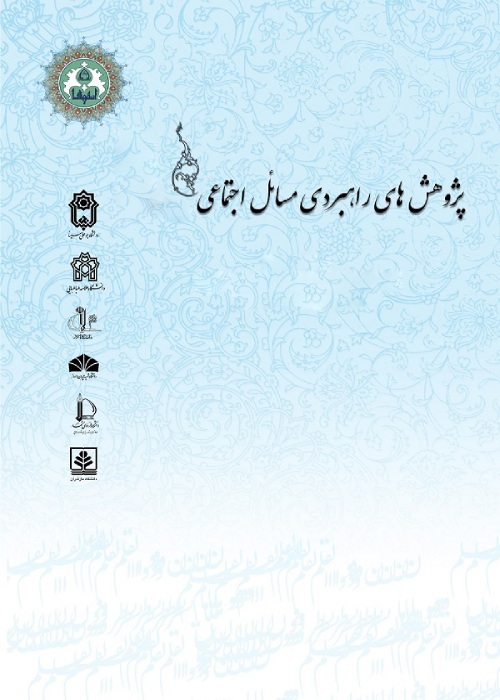Opportunities and Security Threats in Virtual Networks for Students
Author(s):
Article Type:
Research/Original Article (دارای رتبه معتبر)
Abstract:
Introduction
Information and communication technology has led to many changes in human life and in this way it is the source of significant changes in the knowledge of human relations and norms. In the era of electronic communications, concepts have also changed. For example, the concepts of "identity" and "feeling of safety". Due to the widespread acceptance among Iranian users and young people of virtual social networks, studying and recognizing the opportunities of this technology among students and explaining the opportunities and threats provided to users is necessary. Therefore, the main objective of this research is to identify the challenges of security, opportunity and threat in virtual social networks for students. One of the domains affected by virtual space is public security and social security. Considering the necessity and importance of this issue, the present research studies the relationship between the functions of virtual social networks and public security among students.
Materials & Methods
The present research is a combination of document-based and survey methods, that is, descriptive, and analytical. In the first place the researcher, through exploration of related scientific sources, obtained various factors and variables through descriptive-analytic method and then to measure the extent of the impact of each of the variables on each other, the survey method was used based on questionnaire. Also, in order to identify and clarify the weaknesses, strengths, opportunities and threats (SWOT), a qualitative interview approach was used to interview the experts and professors of the university in in 1395. The statistical population of the research includes a number of experts in the field of media, virtual space, social sciences and culture with a sample of 15 individuals and in the quantitative section: male and female students of the Islamic Azad University of Karaj Branch with a statistical population of 370 subjects, who were obtained by Cochran formula and the error rate of 5% by simple random sampling method. The validity and reliability of the research questionnaires were approved by the experts. Also, in order to measure the reliability of the questionnaires, the Cronbach's alpha method was used and using SPSS software, the alpha for each dimension and the coefficient was equal to 0.81, which is a sign of high reliability. Data analysis was performed using descriptive statistics, Kolmogorov-Smirnov test for normalization of variables, matrix analysis, t-test and ANOVA.
Discussion of Results and Conclusions
In line with the research hypotheses, the relationship between the opportunities and threats of virtual social networks with the components of security, identity and virtual ethics of the students was investigated. The results of the analysis show that the most important threats and weaknesses of the field of security in virtual social networks for students are: identity crisis, declined ethical norms, increase in corruption, unethical relationships, electronic addiction, reduced motivation for education, and the most important points, strengths and opportunities include: the development of virtual training, the development of scientific communication, and e-commerce. Based on this, we conclude that the level of threats and weaknesses in virtual social networks for students is greater than the amount of opportunities and strengths. As a result of weakening of social security and virtual ethics, students are more affected by technological threats. It also stimulates the virtual social networks, thoughts and dreams of individuals. However, because this technology enables the exchange of information, the establishment of communication and the global dissemination of the ideas and views of users happens.Keywords:
Language:
Persian
Published:
Strategic Research on Social Problems in Iran, Volume:7 Issue: 2, 2018
Pages:
87 to 98
magiran.com/p2005435
دانلود و مطالعه متن این مقاله با یکی از روشهای زیر امکان پذیر است:
اشتراک شخصی
با عضویت و پرداخت آنلاین حق اشتراک یکساله به مبلغ 1,390,000ريال میتوانید 70 عنوان مطلب دانلود کنید!
اشتراک سازمانی
به کتابخانه دانشگاه یا محل کار خود پیشنهاد کنید تا اشتراک سازمانی این پایگاه را برای دسترسی نامحدود همه کاربران به متن مطالب تهیه نمایند!
توجه!
- حق عضویت دریافتی صرف حمایت از نشریات عضو و نگهداری، تکمیل و توسعه مگیران میشود.
- پرداخت حق اشتراک و دانلود مقالات اجازه بازنشر آن در سایر رسانههای چاپی و دیجیتال را به کاربر نمیدهد.
In order to view content subscription is required
Personal subscription
Subscribe magiran.com for 70 € euros via PayPal and download 70 articles during a year.
Organization subscription
Please contact us to subscribe your university or library for unlimited access!


